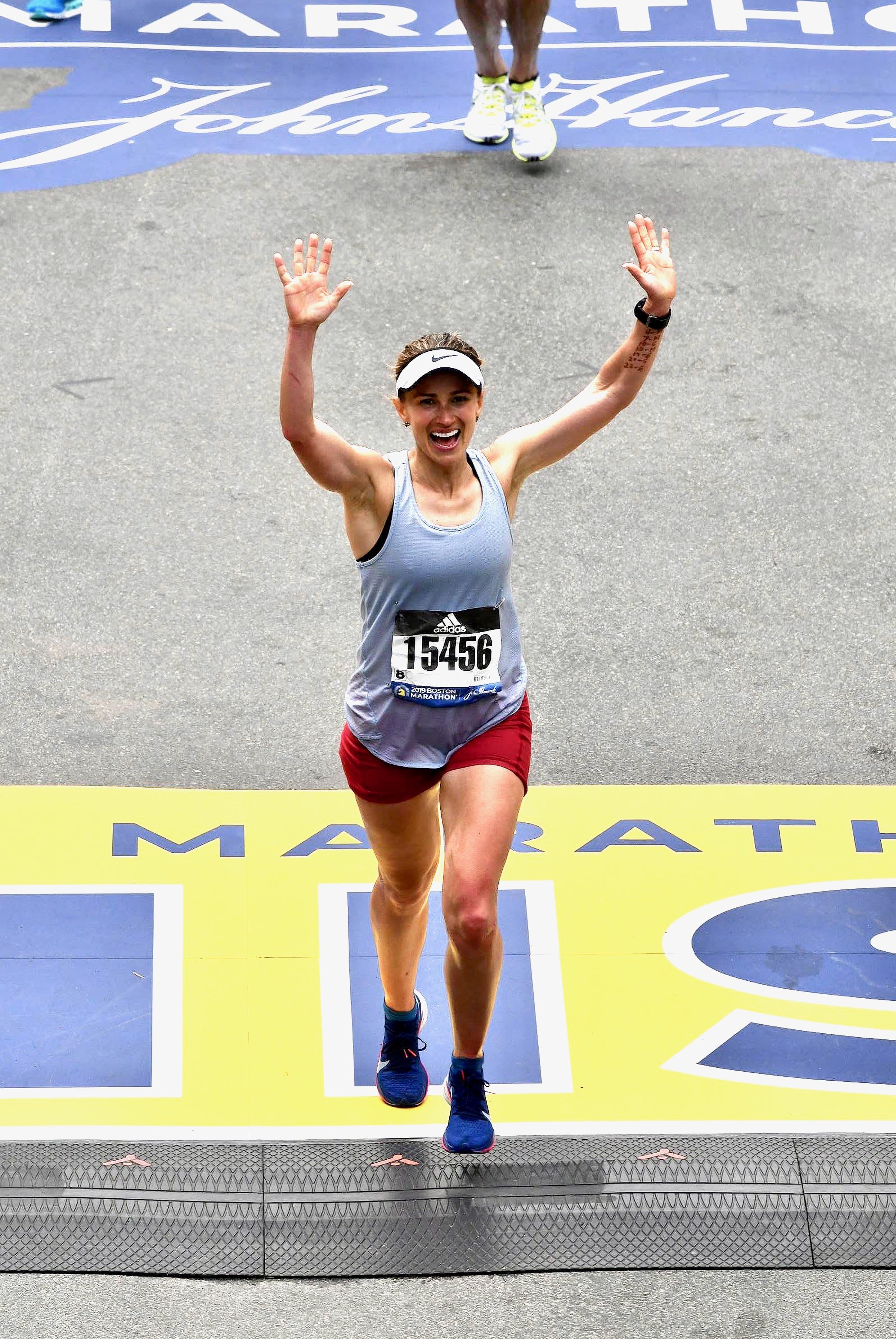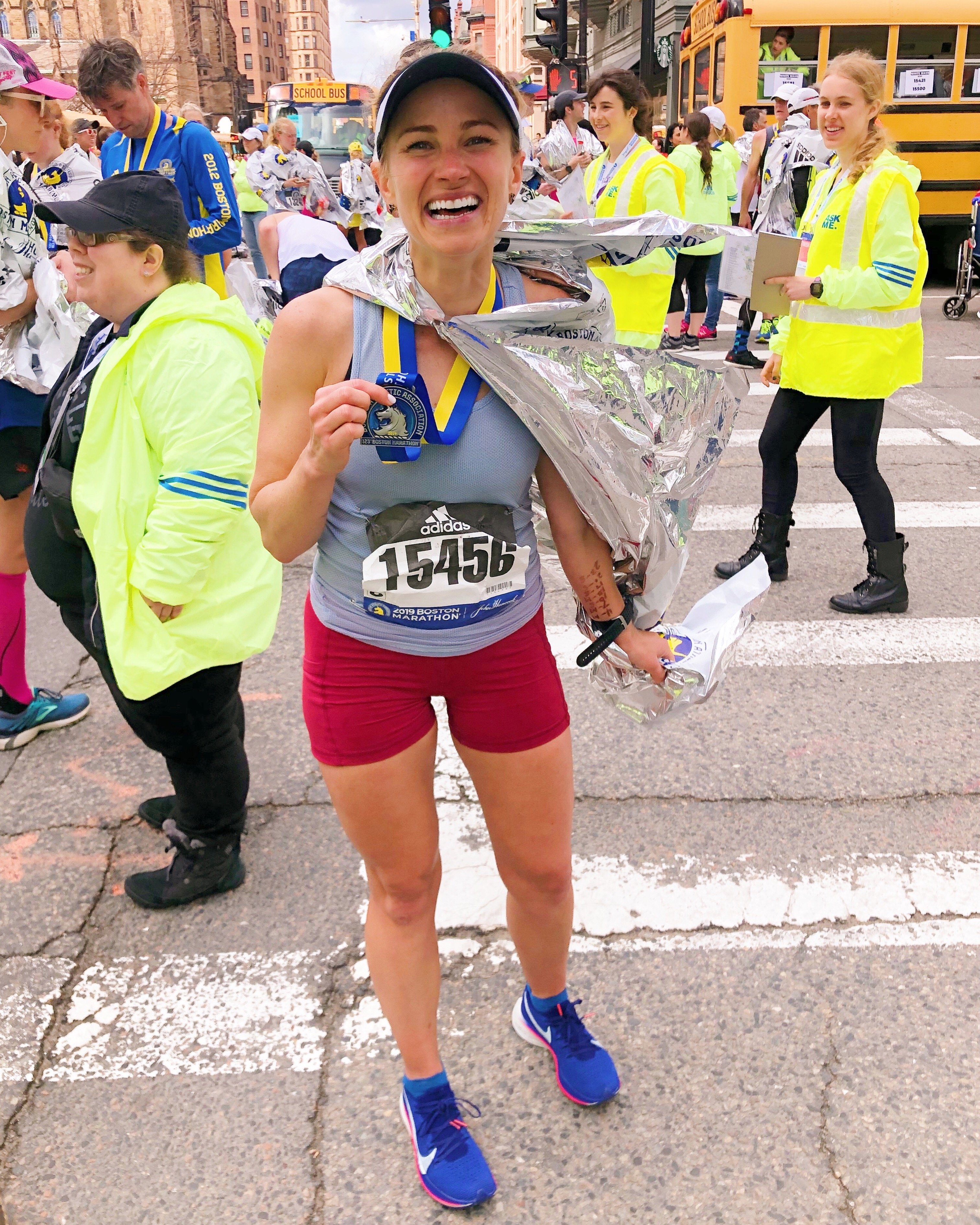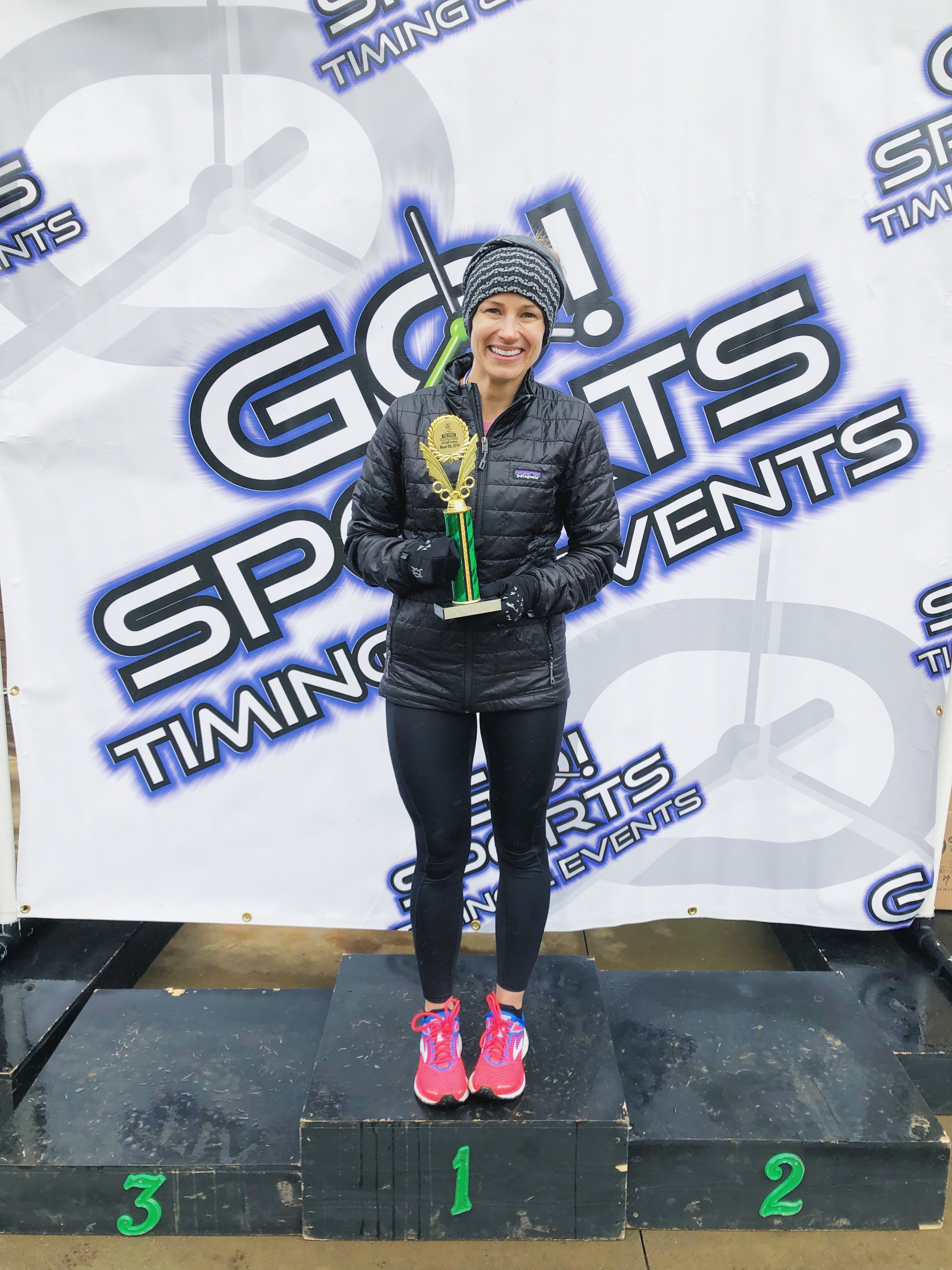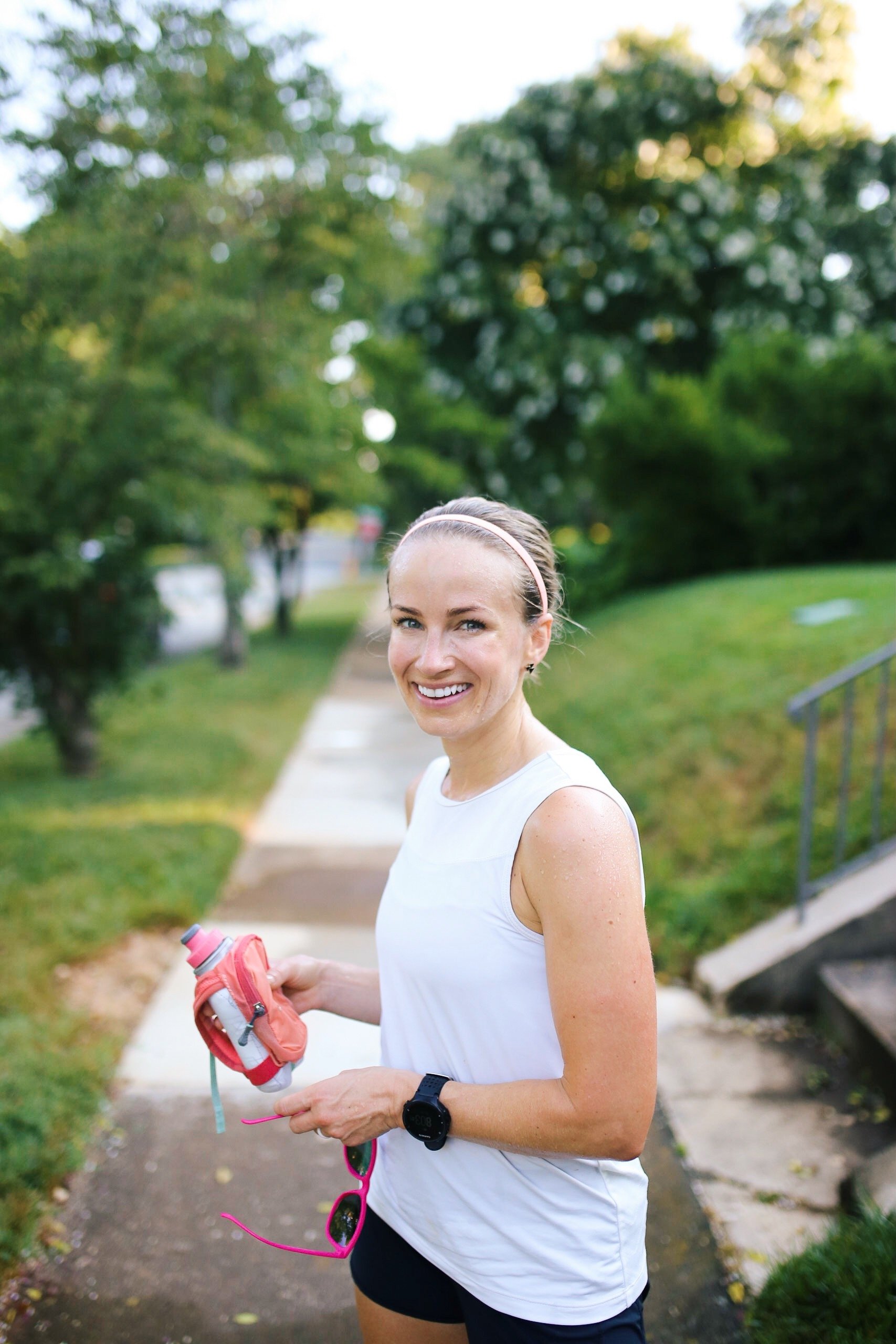

In our old house (we moved last year) we lived on a fairly busy road that was a popular route for runners (or at least a starting point for many runners!). Since I’ve worked from home for 5+ years and my office looked out onto the street, I definitely recognized the regular runners. And since the summer of 2020 when the gyms closed, I started seeing a LOT of new faces pounding the pavement and many of those faces are still out there running. It makes me happy to see others discovering a love of the sport I love so much.
Whether you’re new to running or have been logging miles for a while, there is always something you can focus on with running, whether it’s running faster, running longer or training for a race. The key to a lifelong love of running is to enjoy the process as much as results.
How do you focus on the process?
You get the point: the options to mix up your running and still enjoy it are endless. Before we dive all the way into this post, if you’re interested in a much more in depth running course, join The Rookie Runner Program! It’s my online course and training program for people who are ready to make running a consistent habit in their life and feel better physically, emotionally and mentally.
Okay, let’s get into some tips to run faster. Let me share a little bit about my running experience, and how I increased my running speed over the years.
The first ever race I ever ran was the Moab Half Marathon in 2005, which I ran in 1 hour, 57 minutes.
My next race was a Ragnar Relay and then a 5K, which I ran in 25:56.
When I ran my first marathon in 2009, took me 4 hours, 6 minutes.
Now 16 years after my first race and 50+ races later, my current PRs are:
I wrote in my journal when I was 20 that I wanted to qualify for the Boston Marathon but never remotely believed I actually could, and I’ve since run it twice. I’ve placed in my age group at multiple races, won a couple in the women’s division and even outright won a race once, beating all the men. (Gotta love small races! 🙂 )
Remember, speed is ALL relative. My times may look slow to some yet impossible to others. And remember that people feel the same way about YOUR running speed, regardless of what it is.
I wouldn’t say I was born naturally fast. When I started running around age 14, my training runs were in the 10-11 minute mile range and it wasn’t until I was about 25 that I started to focus on running faster. Over the last 10+ years, I’ve worked very hard to improve my race times, followed many training plans and even hired my first running coach one year which led to a huge PR in the marathon (at Boston, no less, a notoriously hard course).


I often get asked by new and seasoned runners, “How can I increase my running speed?” There isn’t one thing you can do to run faster but rather it takes a combinations of things.
It’s not completely unreasonable to expect some improvements in speed right away, especially if you’re a new runner. But it’s also not reasonable to expect huge improvements after just a couple months.
Huge improvements in running speed take years to discover. And what’s especially exciting about that is that you really don’t know how much faster you’ll get over time. If you cut 15 seconds per mile off in your first 3 months of running, that’s awesome. But you may end up cutting 2 minutes off per mile after years of work. There is so much untapped potential when you’re new since you just don’t really know your body yet. And again, this is where focusing on the process is so important because that’s where the real work — and results — happen.
Learning to love the process and identifying progress in training will help you enjoy race day even more, regardless of whether you meet your goal or not. I always think of race day as a celebration of my work. Yes, I set race day goals but the majority of joy that running gives me comes from the day to day miles and workouts, not solely a finish line.

And yes, at some point, you’ll eventually slow down. But more and more runners are continuing to tap into faster speeds later in life, both in the recreational and elite runner populations.
So, let’s dive into some ways to help you run faster.
So what if you’ve been running for years and don’t feel like you’re getting faster? I would ask you to evaluate a few things:
Go through that list, honestly answer each and evaluate it. Yes, there will be periods where an injury or life causes a setback or limits your training. Factor that into your goals as well. But a long, healthy running career is consistent, even through life’s inconsistencies.
Sometimes consistency is being really diligent with PT to recover from an injury. Other times, it’s recognizing that you’re in a period of life where it’s not reasonable to put in consistent training and manage your own expectations.
Okay, now keeping the answers to those questions above in mind, here are seven tips to improve on each point.
You won’t get faster if you don’t practice running faster and really push yourself (more on that in #3). I first started running intervals on the treadmill mostly because I kept getting bored on the treadmill. And then I noticed how much my “fast” speed on the treadmill started improving and it motivated me to keep pushing the pace.
I didn’t do anything formal in the beginning: just warmed up for about a mile and then started alternating between running fast for 30-60 seconds and running a slower pace for 30-90 seconds. I also tried I increase my speed one notch with each fast interval. My faster pace was anywhere from 5:45 – 6:30 min/mile and recovery around 8:30-8:45 min/mile.
Fartleks and strides are another way to break up steady running pace without doing formal intervals. Adding in fartleks mid-run or strides at the end of your runs a few times a week will improve your running form (even your posture!). And good form will improve your running economy, which will also help with speed. Fartleks simply means “speed play”, where you vary your pace throughout the run and strides are 4-6 bursts of fast running for about 100 meters. (If you’re not familiar with “fartleks”, “strides” or other running terms, you’ll find the Running Dictionary in my running course helpful!)

Now my speed training is much more structured and much more specific for whatever goal race is next on the calendar. I may do some short intervals, tempo runs, long runs with pace changes. Lots of variety creates different stimulus, which drives change and improvement.
Your workouts – both in distance and pace – should be tailored to your goals. If you’re trying to break your 5K PR, that will look dramatically different than a marathon training plan. A good training plan should incorporate speed workouts specific to your race distance. And once you’re more experienced, putting in more miles each week, including some longer distances, will benefit you a lot to improve your base fitness.
And don’t forget about strength workouts. Increasing strength in both your upper body and lower body will make you a more efficient and more powerful runner, which translates to speed. I really like the Strength for Runners workouts in the Peloton app.
Practice perfecting your workout schedule to include a variety of workouts, easy runs, strength training, and rest. Changing up your running routine will help you in more ways than one!
I never really set out to improve my running speed or race times. It was fun when it happened, but when I started seeing big improvements in pace and race times was when I started running with people much faster than me.
And yes, a lot of the time, it sucked running with them. I was frustrated that their “easy” pace was killer for me and embarrassed when I had to ask them to slow down or just go on without me.
But my ego is such that I worked my butt off to keep up as best I could and, eventually, my easy pace re-calibrated. My easy pace used to be a 9:30 – 11:00 min/mile and now my easy pace for longer runs is around 8:15-8:45 min/mile. (If I’m marathon training, my recovery runs will still tip into 9 and 10 minute miles.)
If you are constantly battling an injury, it’s going to be hard to push yourself while running. And if you can’t push yourself, it’ll be hard to make improvements. While I still struggle with injuries from time to time (a torn posterior tibial tendon most recently), I’ve learned to address aches/pains from overuse injuries sooner than later.
To help with injury prevention, I try to be proactive and somewhat regular with yoga or cross training, dry needling, chiropractic adjustments, strength training (particularly core and hip work, with focus on some upper body muscles too!), and massage. If you aren’t doing strength training weekly, I highly recommend it. It’s beneficial for all runners, but especially runners who are trying to get faster. Strengthening your leg muscles (glutes, hamstrings, core muscles, etc) will make you stronger AND faster. I have a friend with an amazing runner’s core program, which I highly recommend since core strength is so important as a runner. Tack a small amount of strength work (a few squats, lunges, heel calf raises, and plank holds) onto the end of your run if you have time. This is a great way to work on your stability.
Double check that your shoes aren’t too old, since this can lead to a multitude of injuries, especially in your feet and knees. If you need to get a new pair of shoes, do it. It will be cheaper than having to see a physical therapist ;). I try to make my running shoes last as long as possible with these tips, but when I know it’s time for a new pair, I don’t hesitate. Read more tips for how I keep injuries at bay here. And read how to come back from a running injury here.
Runners need 7-9 hours per night. More and more research is showing that sleep is the MOST important recovery tool out there. And make sure your easy days are TRULY easy. Keeping an eye on your heart rate is a good way to do this. Aim for 65-70% of your max heart rate. You can also run with a slower friend and talk the whole time to keep your slow runs slow. Conversational pace is a good gauge for an easy run.
And while you’re prioritizing sleep, make sure to check your nutrition out as well. As a runner, you already know how vital proper nutrition is, so be cognizant of getting enough calories in your diet. This is what I eat before a run, and here’s what I eat afterwards.
Also, do NOT try to run faster AND longer. Trying to increase your speed and your distance at the same time will significantly increase your risk of injury. Focus first on building up a solid base of mileage, with easy miles. Then ease into speed work with some short strides (4-12x of 30 second pick-ups at the end of a run followed by 30-60 seconds easy jogging or walking). Once you are running your base weekly distance for 4-6 weeks, then you can start to add in more structured speed work.
I used to not think much about what I ate before and after a run. I always had something, but I wasn’t very intentional about it. While I try not to obsess over food, I am very intentional with my diet to fuel my running goals — particularly right before and after a run. In order to run your best, you MUST be properly fueled. And carbs should be a large portion of your diet. Read this post for more details on the importance of carbs and how the amount you eat should change as your training increases in volume and/or intensity.
When I was training for the 2019 Boston Marathon, I had my diet analyzed by a registered dietician who specializes in sports performance. He identified that I was under-fueling. While my protein intake was adequate, I wasn’t getting enough carbs to support the mileage and high intensity I was putting in. Read what he suggested I change here.
Even when I’m not in training mode, I rarely have more than 1-2 glasses a week. If I drink more than that (in terms of number of days or glasses at one time), I really feel it on my runs, and I’m significantly more tired throughout the day. So it’s just not worth it to me.
Over the years my body weight has fluctuated. But being lighter does NOT always equal faster. I set my marathon PR at one of my heaviest weights. But, the moral of the story is if you aren’t at a healthy weight — either too heavy or too thin — it may limit your potential. Find a healthy weight where you feel good and makes sense for your body type. That may mean you need to lose weight or gain weight. Being too light can also lead to injuries and more serious problems as it relates to your relationship with food.
I used to have the motto that I run because I enjoy it and if I push too hard, I won’t enjoy it. And that motto was fine for a time.
But then I wanted to get faster and that motto can’t apply when working on speed. I had to learn to deal with discomfort from pushing the pace and also know the difference between discomfort and pain. Now, I almost always prefer a workout to a steady state run.
Make sure you’re doing warm-ups before each run, since this will likely make the first few miles more comfortable. Here are 21 ways to make running easier.
Running a race will also help you learn to embrace discomfort. You’ll push yourself harder in a race than you will on a regular training run so this is especially helpful if you just don’t like pushing yourself. Plus, you’ll be energized by the running community, which helps you stay motivated and excited about running. It’s usually a very good thing to get out of your comfort zone.
My favorite training mantra is “This is what you’re here for.” For race day, I like “I trained for this feeling.” and “The faster I run, the sooner I’m done.”
If you aren’t consistent, it’s going to be hard to see those big breakthroughs. Yes, rest days are important and some time off may be forced due to an injury. But if you only train in spurts, with more time off than on, you’re unlikely to make meaningful improvements in speed.
So what if you ARE consistent? It can be hard to see that you are actually working towards a big breakthrough. But it really is the day to day things built over weeks, months and years that lead to big improvements in speed.
That’s where having a long-term perspective can be helpful and where recognizing improvements along the way will help you stay motivated before those big throughs.
You may drop big chunks of time off your races in the beginning. Or your may not. You may be at the point where even 3 seconds faster is a win. Or maybe the win on any given day is remembering to stretch after every workout. You may run significantly slower in the heat but you still get out there and run in it. (Here are my tips for running in the heat.)
Part of the key to staying motivated long-term is to remember WHY you started running in the first place and celebrating along the way, not only at big breakthroughs. Again, process over outcome.

I got older. I’ve read before that women reach their peak in running from about 28-38. It might be a coincidence since I’ve also starting training harder as I’ve gotten older, but it seems to be happening.
But more importantly, I’ve gotten wiser (most of the time) and listen to my body when it really needs more recovery or more fuel — or to be pushed a little harder.
It’s taken years of hard work but I still believe I have more speed in me. And that’s exciting. And you probably have more in you too.

What have you done to increase your speed? Which of these seven things do you think you could work on? Let me know if you have other running tips for increasing your speed in the comments below.
My Must-Have Running Gear


Leave a Comment
51 responses to “How to run faster: 7 ways to increase your running speed”
Love this! Motivation for me to push it. I want to PR in my halfs this spring!
good luck Clare! You can do it!
Great tips! I’ll definitely have to give treadmill intervals a try–I’d love to flatten my tummy a bit.
I also had never heard that about a woman’s running peak. I’m glad to hear it, as I thought my speedy days were behind me–now I have something to look forward to, perhaps?
definitely! I bet you’ll surprise yourself!
I know speed is an area of my running I could afford to work on. Distance is no problem, but it only goes so far (no pun intended). I know the things I need to do, but I always seem to comfortable with my steady, long pace. Time to bust out some intervals. And maybe a new running partner? 🙂
Those are wonderful tips!
#1 did wonders for me, and #5 is very powerful and something I definately can work on!
#5 is something I’m constantly working on! Cute gravatar, BTW. 🙂
Love this! I always thought fast running was something out of my reach, but you make it sound a little more approachable!! I also think #5 is a big one for me and #1 has always intimidated me.
… Oh my I am 44 yikes past my running prime. :). Great post. For me, I really need to start dealing with the discomfort.
You can just find your running prime in something other than speed now 😉
Thank you for these tips. My first 5K was 24:08 and now I want to train for a 1/2. My pace has slowed and I think it’s mainly due to the opposite of 2 & 5 – I gained weight and I haven’t really been pushing myself! Ha! Hoping my new Garmin will be inspiration, but I’m definitely going to start doing some interval training again. Any other tips for increasing mileage?
My Garmin really helped inspire me to pick up the pace. For increasing mileage, I found that running with friends helped a lot because I wasn’t so focused on how long I had been out there and just enjoyed my time with them.
28 must be the magic age, bc I’ve been kicking ass this year too. I attribute my faster speeds to intervals, running more often, half marathon training, and apparently age! 🙂
nice!
I think running intervals definitely helps! They helped me prepare or my first 5k.
I definitely got faster when I got more and more bored on the treadmill and started doing intervals. And when I learned that I could survive running at an uncomfortable pace. That part was hard. But beating PRs really is such a boost. Not near as fast as you though! My 5k PR is 24:48.
I agree with you on the intervals. They have always helped me build a bit more speed, and they’re fun when working out on a treadmill!
These are such great tips! I really need to start doing some interval training and speed training. I’ve been “enjoying” running for a few months, but it’s time to kick it in gear with a marathon coming up that I’d like to race in.
Interesting tips. I’m far, FAR slower than you (my PR is more than 10 minutes slower than you!) so of course, I’d like to get faster. I’ve ran intervals on the treadmill many times before but it doesn’t seem to make me faster for longer than that interval. When I go to do a longer, more steady run I still have to slow down to my normal pace in order to go for any distance. Maybe if I do it more consistently??
I found that doing intervals regularly, about 2x a week, really helped my speed & stamina. How do you do your interval training? My sessions last 30 min and i generally do 1 min @ easy pace then 1 min “sprint” and repeat. So basically I’ll run at a 10min pace then an 8 min pace and repeat. Or if I’m feeling energetic I might try a faster pace for my sprints.
I hope that helps a little 🙂
thanks for sharing Rebecca!!
ThiS is a great list! I have also found that running with others and learning to push thru disconfort has helped me immensely with my running (and with other fitness pursuits). Nike got it right with Just Do It, and be open to how far your body will take you!
Thanks for the tips! These are awesome and timely for me right now as I am prepping for May races! I have noticed that intervals on the track and on the hills and stairs, where I push my heart rate up for periods at a time, are what are making me stronger and faster. It certainly makes logical sense that dropping some pounds will increase one’s speed….although I hadn’t thought of that in awhile! Thanks for the post! Happy running in 2013 and thanks for the motivating energy!
oooh yeah, stair intervals are killer but SO good!
I loved this post not because I’m trying to be a fast runner but because I think in general there are just good work out tips in here. I would love to see what one of your treadmill interval training looks like. Maybe you could email me? 🙂
Great suggestions! One of my 2013 goals is to PR in a race (not pinpointing what distance) so these are really helpful ideas 🙂
glad they helped! good luck with your PR this year!
You read my mind! One of my fitness goals for the year is to become a faster runner. I’ve been toying with intervals on the treadmill, but after seeing that note on the belly fat, I’ll definitely be more diligent about it!
I agree with #1 for sure. I hate intervals mostly because of #5… So maybe that’s a sign? 🙂 thanks for sharing!
haha! 🙂
I totally agree about age making you faster– I’m 32 and I’ve noticed my speed increasing over the years! This is a great post
Great tips! After being a long distance runner all through high school I definitely agree with you. Now if I could just beat my PR’s from high school…oy.
hahaha. good luck with that! 🙂
when I started running I got discouraged running with people faster than me,but I can see how that can help. I’m just getting back into running ( my last race was 2 years ago) and so I’m going to focus on #2 and #5 for sure. I think I stopped running because I felt I was slow and it wasn’t enjoyable ( bad excuse! ) so these tips are perfect for me as I start my journey again! Thanks!
good luck as you start again! don’t let being “slow” deter you – everyone’s pace is different. what matters is what feels good and right to you!
I ran more mileage than I ever have (peaking at 105 miles in a week) and broke all my PRs this summer! (As a disclaimer: I am NOT saying that everyone should do this!) But I do strongly believe in running as many miles as your body can tolerate.
that’s a good point. sometimes you really do need to up your mileage so your body learns to handle longer distances, higher discomfort and then subsequently improve in all other areas, like speed and efficiency. i still am in awe you ran that much!!
Great job with bringing down your times, girl! Your PRs are right around my goals for this year. I definitely think they are within reach. I just need to get used to the discomfort again! Being pregnant made me a baby 🙂
haha. I think having a baby would make me a baby. 🙂 Good luck with your PRs!! you and your husband are so motivating at making me want to push myself in running more!
If you really want to Increase running speed you should check out the workouts and drills at King Sports Training. They have a bunch of things that can help you become faster, as well as more agile. They have really been a big help to me.
This is so helpful, because I feel like running is finally starting to click, after beginning in 2010. Injury after injury and waking up that weight loss is going to be a key component helped me to get back to basics; start watching what I eat, blog to stay committed to the cause, and keep up with my training. Thanks!
Hi Teri, thanks for directing me to this post. I can relate to #5. up until now, my mantra has pretty much been “run because you like it”. but now i want to take it more seriously and that requires tougher goals. i think the biggest hurdle will be shifting perspective to channel that competitive edge and learn to run through the discomfort. thanks for the inspiration!
I understand – it was a big shift for me too! Now I have to remind myself that not every run needs to be hard and I should have “just for fun” runs too. 🙂
I love this post, and I’ve come back and re-read it several times! I am not a fast runner – but would like to start shaving some minutes off my PRs – I think #5 is the hardest! It’s so motivating to see my pace decrease, though!
Nice will follow.
GREAT post! I am going to be the intervals and running with faster people are the two main things that have attributed to your speed. I did a program a couple of years ago through a sports performance center where I live and everything was based on my hart rate zones, but the jist was I had some run days with intervals, and some where I ran at tempo speed (i.e. the days where you are running with faster people), plus having more rest days (turns out, running less is good!). Congrats! It’s kind of addicting once you realize how much you can improve, isn’t it?!
Did you reach your goals?
I am using your ideas at age 62 (M) to try and regain speed that I lost from casual running. I used to run 2:34. Thanks for your ideas.
These are such great tips!
xx
Lauren Elizabeth
Petite in Pearls
I once read read something that said women peak 7 years after starting to seriously run. I ran on treadmills in my 30s and ran my first half at 40. Since then Ive avoided treadmills like the plague, lol, multiple halfs (PRd at 46 with 1:37), two fulls , NYC and then Boston this year where I got another BQ. I’ll be 50 in 6 months. I’m really looking forward to this new age group but also really need to shift my mindset. I still want to run well, and think I can still win/place in my age group, but my PR days may be over. I think, who knows. Recovery is really hard for me. Really hard. But I think that’s going to be key for me continuing to run strong at my advanced age lol
I really love learning more about your running journey! It’s so inspiring since you seem to keep improving as you age! I mean, 1:37 half at age 46?!?!!? AMAZING.
And why is recovery so hard for us? 😉
thanks for always reading and commenting Mina!
xo
Any tips on breathing techniques while running?